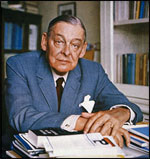 A preview of the 10 shortlistees for the prestigious poetry prize
A preview of the 10 shortlistees for the prestigious poetry prize
The annual 10-book shortlist for the £15,000 TS Eliot prize can be re-lied on to provide an intriguing mix of obvious candidates and surprising outsiders. But the experienced poet judges for 2009 (Simon Armitage, Collette Bryce and Penelope Shuttle) have added some particularly wild cards to the four choices already delivered to them by the Poetry Book Society. (The PBS makes a quarterly choice for its members, and those four titles automatically go on the shortlist.)
Last year saw admirable new collections from Andrew Motion, Don Paterson (winner of the 2009 Forward prize) and Peter Porter. None is among the Eliot 10. Sharon Olds is; but her marvellous fellow-American John Ashbery remains oddly beyond the range of the judges. One of the PBS choices, Alice Oswald’s Weeds and Wild Flowers (Faber), presents a problem. The poet described it as “two separate books”, her poems not relating specifically to Jessica Greenman’s prominent, beautifully exact etchings. The poetry has a weird charm (Snowdrop is “A pale and pining girl, head bowed, heart gnawed”), but lacks the boldness and range that won Oswald this prize with Dart in 2002.
Fred D’Aguiar’s Continental Shelf (Carcanet) contains a series of elaborate, passionate — but much flawed — elegies for campus victims of the shootings in 2006 at Virginia Tech where he was teaching. The collection would have stood up with Local Colour alone — a far better section of poems about his childhood in Guyana, as in H20: “Someone tall stationed at/barrels lifts our buckets/ tips contents into drums, that fill from a brassy soundof flustered metal to muffled/ contentment of water/ breaking the fall of water."
Two other shortlisted books of comparable ambition similarly fail to show their authors’ talents to advantage. George Szirtes’s The Burning of the Books and Other Poems (Carcanet) bursts at the seams, grappling comprehensively with modern European history and culture, but it requires readers to be familiar with, for example, Elias Canetti’s horrific masterpiece Auto da Fe and the paintings of Howard Hodgkin. There’s nothing wrong with that, but Szirtes on Woolworths touches us more closely: “The infinite melancholy of small pickings/ firelighters, matchboxes, ashtrays. Cheap/ vanishings. Vultures.” Philip Gross’s The Water Table (Bloodaxe) attempts effortfully a poetic view of the entire interaction of land and water on the Severn estuary, where he now lives. In places, he moors some more modest poems that make a clearer point: Dead Letter, or Elderly Iceberg off the Esplanade, “a message from last-ness."
Jane Draycott’s Over (Carcanet) has an emotionally charged yet cryptic style that is at its most approachable in poems concerning parenthood or marriage (the excellent Picnic), while the raw confessional mode of Sharon Olds’s One Secret Thing (Cape) recalls Sylvia Plath and Anne Sexton in the 1960s, with sequences about war, adolescent awakening, or (the best) her mother’s second marriage and death.
Christopher Reid’s elegies for his wife in A Scattering (Arete) are candid in their detail yet are reticent and dignified in re-creating their last months together; as when he remembers her singing, and registers “a silence now final and hard to listen to./ Show tunes, folk tunes, Lieder, blues/ Silent, deleted, permanently lost."
The Sun-Fish by Eilean Ni Chuilleanain (Gallery) raises the question of how so commanding a talent has escaped the attention of many English readers. These poems charge with mystery and compassion their account of a rooted fear and suffering that still clouds the atmosphere of modern Ireland — read between the lines of the title-poem, or The Sister, or The Litany, where, “The soaking tears of centuries drift down/ Low passages in between the stones.” This surely deserves to be one of the best propositions for the prize, along with Sinead Morrissey’s Through the Square Window (Carcanet), which offers scary and witty poems about pregnancy, birth and a child acquiring language. There is some risk of overload, but the assemblages of eerie detail in Electric Edwardians and (especially) Telegraph make those poems memorable.
Hugo Williams’s West End Final (Faber) offers finely timed work of immediate appeal on time-honoured subjects. His dozen Poems to My Mother, and Pillow Talk (a funny, touching, original take on a love affair), deepen with each reading. Growing older chills Williams: “You come to a standstill in the hall/ Spots dance. Blood flows/ You have to smile / when the mist clears?/?and you don’t know where you are."
Top of the chart, possibly?
The Sunday Times
January 10, 2010